About Wayward on Netflix
Wayward is an American psychological thriller miniseries that premiered in September 2025. It quickly became the most-watched show on Netflix worldwide, reaching the top spot in 32 countries. The series even surpassed Alice in Borderland and House of Guinness, the successor to Peaky Blinders.
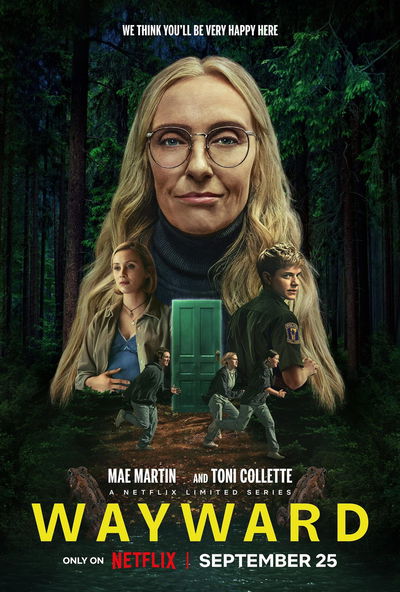
Created by and starring Mae Martin, the series is based on true events. Its main inspiration came from Martin’s best friend, Nicole, who was sent to a boarding school for troubled teens at 16. The story also draws from Mae’s own experiences growing up in the early 2000s.
The cast includes Mae Martin (Alex Dempsey), Toni Collette (Leanne/Evelyn Wade), Sarah Gadon (Laura Dempsey), Alyvia Alyn Lind (Leila), and Sydney Topliffe (Abbie).
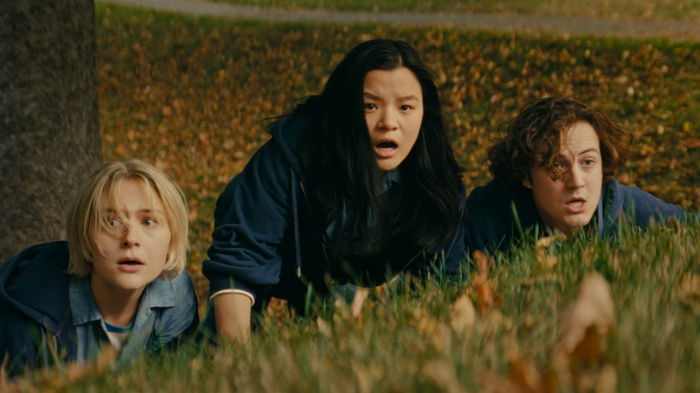
The story takes place in the seemingly peaceful town of Tall Pines, which hides dark secrets connected to the Tall Pines Academy, a controversial institution for so-called “troubled” teens.
After an escape attempt, two students from the academy team up with Alex Dempsey, a newly arrived police officer. Together, they try to uncover the disturbing practices hidden behind the school’s facade and its charismatic founder, Evelyn Wade.
Official Trailer
The Troubled Teen Industry That Inspired the Series
The inspiration for Wayward came from Mae Martin’s research into Synanon, a self-help cult founded in 1958 by Charles Dederich. The cult is widely recognized as the origin of the Troubled Teen Industry (TTI). One example of its influence appears in episode three, featuring the “Hot Seat” exercise, where participants verbally attack each other and then embrace. This is identical to the Synanon Game.

The organization quickly transformed into an authoritarian cult marked by psychological and physical abuse under Dederich’s increasingly tyrannical leadership.
Synanon’s confrontational tactics directly influenced many later institutions and cults, particularly those involved in youth “rehabilitation” and “reeducation.” Some notable examples that adopted or mirrored Synanon’s abusive methods include:
- Daytop Village (Therapeutic Communities): Early therapeutic communities in the U.S., such as Daytop Village, evolved directly from the Synanon model. Their use of radical self-help and encounter groups demonstrated Synanon’s deep influence on rehabilitation practices.
- Straight, Inc.: A network of drug treatment centers for teens in the U.S., active from the 1970s through the 1990s. Known for its intense confrontational tactics and enforced family isolation, it was often accused of physical and psychological abuse, reflecting Synanon’s coercive approach.

- People’s Temple: Founded by Jim Jones, this group ended in the mass murder-suicide at Jonestown, Guyana, in 1978. Like Synanon, it began with progressive ideals and deteriorated into totalitarian control and paranoia.
- NXIVM: Led by Keith Raniere, NXIVM presented itself as a self-improvement organization for adults. Its secret subgroup, DOS (short for Dominus Obsequious Sororium, or “Obedient Women / The Master Overcomes”), revealed the cult’s manipulation, blackmail, and psychological degradation. NXIVM became infamous after the involvement of Smallville actress Allison Mack.
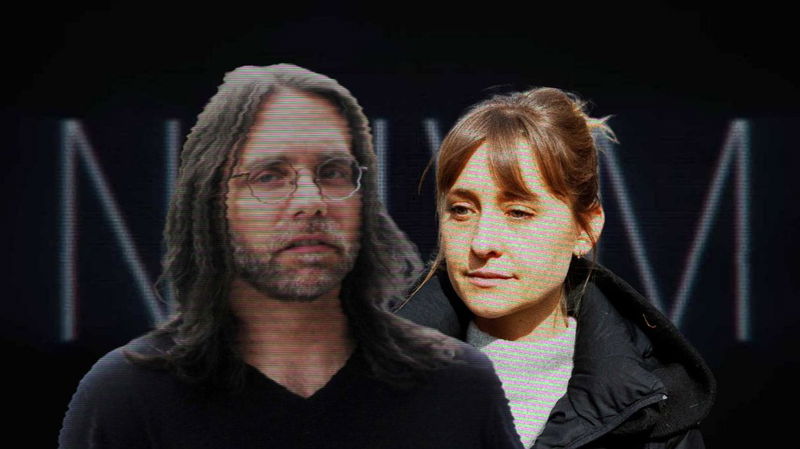
The story of Synanon serves as a serious warning. It shows how a self-help movement can become corrupted and evolve into a system of control and abuse.
This is especially important because Synanon’s confrontational model shaped the modern Troubled Teen Industry, a profit-driven network of schools and camps that often operate with little oversight.
All of this happens under the guise of “discipline” or “healing” young people. In the end, Synanon proves that when the promise of “radical change” combines with total control, what follows is exploitation, trauma, and abuse disguised as help.
Reflection: On the Need to Belong
The Synanon story is a powerful example of how the fundamental human need to belong can be exploited and twisted by cults.
Synanon first attracted recovering addicts who were marginalized, isolated, and without a place in society. For them, and later for non-addicts seeking a deeper purpose, Synanon offered what they lacked: a structured community, a clear identity, and a sense of meaning.

Belonging came to mean blind obedience to the group’s rules. Leaving was seen as failure or, worse, a relapse. This created intense fear of rejection and made leaving psychologically almost impossible. Belonging turned into dependency.
Cults, sects, and even certain religious movements attract people by promising what the world has failed to give them: a family and simple answers. When someone feels rejected or lost, these groups offer an immediate sense of acceptance.
It is precisely this vulnerability, the desperate need to feel accepted, that allows charismatic leaders to take total control. What begins as a search for community and support can quickly become a trap of isolation and abuse.
Personal Analysis

Wayward succeeds in blending elements of a psychological thriller with a raw, socially aware critique. It is gripping and builds a deeply unsettling atmosphere. Tall Pines Academy, led by Evelyn Wade, operates as a cult disguised as therapy.
The series explores how teenage vulnerability and parental desperation are exploited by institutions that claim to “fix” troubled youth while actually subjecting them to abuse and psychological control.
Setting the story in the early 2000s is a smart choice. It removes the convenience of smartphones, heightens the characters’ isolation, and emphasizes the fear of manipulation in a pre-social-media era.
Toni Collette gives a brilliant performance as Evelyn. The villain is not a caricature but a layered, charismatic, and manipulative leader, which makes her even more frightening. She perfectly embodies the idea of “care that becomes control.”
Mae Martin, as Alex, the transgender police officer with his own past and identity struggles, serves as the outsider guiding viewers through the mystery. His calm, grounded performance contrasts effectively with Collette’s intensity.
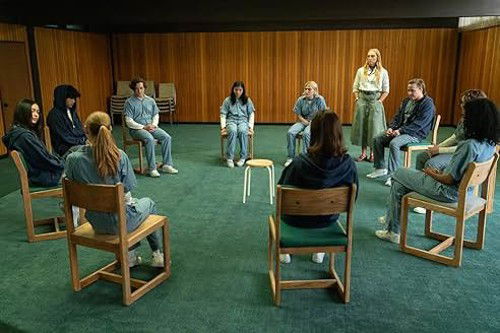
Wayward creates a haunting atmosphere reminiscent of Twin Peaks or Get Out. The growing sense that something terrible is hidden beneath the surface keeps the audience engaged throughout.
However, the ending left me somewhat frustrated and unsatisfied. The climax and final resolutions do not deliver the emotional release the story builds toward. The conclusion feels ambiguous, which may disappoint viewers who expect a clear and cathartic ending.
Critical Reception
Wayward received mixed reactions from critics and audiences, though its strong debut quickly pushed it to the top of Netflix’s global charts. Some praised its concept and performances but were let down by its unresolved ending and open narrative threads.
Rotten Tomatoes: 77% critic score, 46% audience approval.
IMDb: 5.9/10 from 19,000 reviews.
Letterboxd: 3.3/5 stars from 22,000 ratings.
Reasons to Watch

Wayward is a powerful and addictive series that deserves attention. It uses suspense to deliver a shocking critique of teenage boarding schools, exposing how they can operate like cults.
With Toni Collette’s outstanding performance, the story captivates from start to finish, prompting reflection on control, trauma, and what society considers “normal.” It is a dark, well-crafted exploration of the human need to belong.
See you next time!










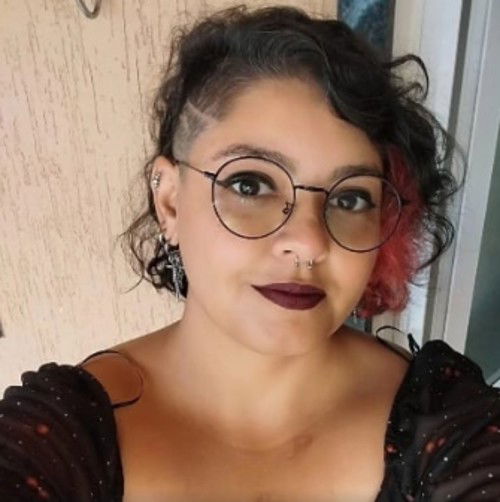

— commentaires 0
, Réactions 1
Soyez le premier à commenter